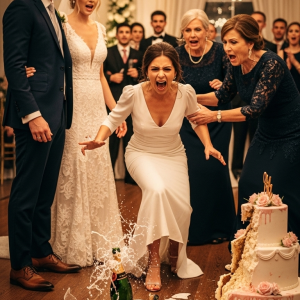My name is Maya. I’m 28, the youngest of four, and being the youngest has never been a term of endearment in my family. It’s always been the reason they talk down to me, a permanent label of immaturity. I don’t have a husband or kids like my older siblings, but I’ve built a life I’m proud of—a career, a loyal group of friends, and a sense of independence they can’t seem to grasp. To them, the only metric of success is marriage and children. By their standards, I have failed.
Christmas dinner is the annual stage for this drama. It’s one of the few times we all gather at my parents’ house, a massive old Victorian that looks perfect in photos but is a nightmare to live in—cold and distant, just like my parents. I’d rather be anywhere else, but every year, I go. Because, you know, family.
I showed up just after everyone else. My oldest brother, Chris, was already there with his wife and three kids, loudly directing the table setting as if he owned the place. My sister, Amy, was there with her husband and their perfect baby, polished and poised, a walking advertisement for the ideal life.
As usual, I slipped in quietly, hoping to avoid the inevitable drama. When my mom saw me, her face lit up with the fake smile she always wore—the kind that says, “I’m tolerating your presence for the sake of the holiday.”
“Maya, sweetie,” she said, giving me a hug that was more obligatory than affectionate. “So glad you could make it. Go ahead and grab a seat.”
I barely had time to respond before my dad’s voice boomed from the dining room, laced with the authority he used to remind everyone he was still in charge. “Dinner’s about ready! Chris, Amy, get the kids situated, please!”
I stood there for a moment, an awkward island in the sea of their bustling preparations. I wanted to say something, to assert my presence, but it was Christmas. I didn’t want to make a scene. Not yet.
That’s when my mom, in that subtle way she had of turning everything into a lesson, spoke again. Her voice was syrupy sweet.
“Maya, why don’t you sit at the kids’ table? We’ve got a special spot for you there with the cousins.”
I froze. I couldn’t believe it. My mother had just asked me, a 28-year-old woman with a career and a mortgage, to sit at the kids’ table. The one they set up every year with mismatched plastic chairs, paper plates, and half-hearted crayon decorations.
I glanced into the dining room. The “adults’ table” was set beautifully with their heirloom china, crystal wine glasses, and flickering candles. There, at the head of the table, was my dad, looking as smug as ever, surrounded by my married siblings and their spouses. No room for me.
I looked back at my mom, the anger bubbling inside me, hot and sharp. I could feel that familiar sting, the one I always got when they reminded me that I wasn’t good enough in their eyes. This wasn’t just a thoughtless comment. This was deliberate.
I forced a smile, but it didn’t reach my eyes. “Sure, Mom. Thanks,” I said, my voice steady despite the tremor I felt inside. She smiled back, an empty, placid expression that told me she didn’t care how I felt. This was about appearances, about her perfect, orderly world.
Without another word, I walked over to the kids’ table, my stomach turning. I sat down on a tiny plastic chair, surrounded by my younger cousins who were more interested in their mashed potatoes than the awkward silence that now filled the air. They were in their own world, ignoring me completely. I stared at my sloppy, unappetizing plate. This wasn’t just about a table. This was about them seeing me as less than. They weren’t even trying to hide it anymore.
And in that moment, something inside me snapped.
I stood up quietly. I didn’t need to say anything. I didn’t need to shout or make a scene. That’s what they expected—the “emotional” youngest child having a tantrum. I wouldn’t give them the satisfaction.
I grabbed my coat, slung it over my shoulder, and walked straight for the front door. As I opened it, the cold night air hitting my face, my mom’s voice finally called out, laced with confusion and a hint of irritation.
“Maya, where are you going?”
I didn’t look back. “I’m leaving,” I said, my voice cold and clear. “Enjoy your dinner.”
The door slammed behind me. My car was parked down the street, and I was out of there, the sound of my parents’ frantic calls already fading. I drove for hours, aimlessly, until I ended up at a quiet 24-hour diner. I sat in a booth by myself, ordered something warm, my hands still shaking from the adrenaline. I couldn’t remember the last time I’d felt this much rage and relief all at once.
That’s when my phone started blowing up. Messages, missed calls. The usual. Chris, Amy, even my dad. But the one that stood out was from my mom.
“Where are you? We need to talk. This isn’t funny, Maya.”
I felt a smirk tug at my lips. No, it wasn’t funny. The ball was in my court now. And they had no idea what was coming.
I sat in that diner for what felt like an eternity, my phone buzzing relentlessly. The messages grew more desperate, each one trying to reel me back into their game.
Chris: Maya, this isn’t funny. Where are you? Amy: Mom is freaking out. We just want you back. Dad: Come on, don’t act like a child. Get back here.
I didn’t respond. I didn’t owe them an explanation. They had made their choice. After about an hour, my mom’s text popped up, and it made my stomach twist.
Mom: I don’t understand why you’re doing this. Your siblings are concerned, and this is ruining Christmas. Don’t make this about you. You’re being selfish.
Selfish. They were the ones being selfish. The whole night had been about their image, their expectations. But to her, I was the problem. Typical. I didn’t know whether to laugh or cry. Instead, I just hit the block button on her number. She wasn’t going to manipulate me into feeling guilty. Not this time.
Later that evening, after the adrenaline had worn off, I decided it was time. I pulled up the family group chat. There were already a dozen messages about me.
“This is ridiculous. She’s acting like a child.” “What’s the big deal? We didn’t mean it like that.” “I think she’s just overreacting.”
I scrolled through them, my fingers itching. I could just ignore it. But that would have been the easy way out. I needed them to feel it. I needed them to understand.
I started typing, my words picking up speed. It wasn’t just about tonight; it was about everything.
“You guys don’t get it, do you? This isn’t just about a seat at the table. It’s about how you’ve treated me my entire life. Like I’m not good enough, like I’m invisible unless you need something. I’m the only one who doesn’t get praised for following the same script you all did: get married, have kids, play the game. But I’ve built my own life, and I’m doing just fine. So maybe it’s time you all recognize that.”
I paused before hitting send, then did something else. I opened the photos app on my phone and scrolled back, years back. There it was. An old Christmas photo, with everyone smiling their perfect smiles. Everyone except me. I was there, of course, shoved to the side like an afterthought. I posted that photo in the group chat.
And then I added a caption: “Here’s to the perfect family. Always making sure the youngest one knows their place.”
I pressed send. Then I turned off my phone. I let the silence settle around me, feeling like I was finally free from their chains.
When I finally checked my phone again, the notifications were as relentless as I expected. Dozens of missed calls. Texts that ranged from angry to apologetic, but all of them coded in an underlying frustration. They were unraveling.
Dad: This is childish. We need to talk about this when you come to your senses. Chris: If you think walking out was going to make a statement, you’re wrong. You’re just making it worse. You owe us an apology.
An apology? For what? For standing up for myself?
Then there was Amy’s message. It was different. Almost pleading.
Amy: Maya, I know you’re upset, and I understand why. But this isn’t the way. You’re my sister, and I love you, but you’re pushing everyone away. Please just come home.
I stared at her words. There was a time when I would have run back, desperate to make everything okay. But I wasn’t that person anymore.
The day dragged on. As evening approached, I found myself sitting alone, staring at an empty chair, thinking. A part of me, an old part, wanted to give in. But I couldn’t shake the feeling that if I went back now, it would be like admitting I wasn’t worth fighting for.
The phone rang again. This time, it was my mom. I had unblocked her, curious to see how far they would go. I took a deep breath and pressed the green button.
“Maya,” my mom’s voice came through, tired and exasperated. “We need to talk. This has gone on long enough.”
I stayed silent.
“Look,” she continued, “we’re family. You’re making this more complicated than it needs to be. I don’t know what’s gotten into you, but you’re pushing everyone away.”
They were upset. After everything they had put me through, they had the audacity to say they were upset.
“I’m not pushing anyone away, Mom,” I said, my voice calm but firm. “I’m just not playing your game anymore. I’m not going to sit at the kids’ table, be treated like I’m invisible, and pretend everything’s fine.”
She was quiet for a moment. I could almost hear her processing, trying to figure out how to twist this back into a guilt trip. “You’re breaking the family apart, you know.”
“I’ve spent my entire life trying to fit into the mold you all created for me,” I shot back. “But no one ever saw me, did they? You didn’t want me as an adult, Mom. You wanted me to stay the little kid forever. And tonight was the last straw.”
She was silent again. For the first time, she was hearing what I was really saying.
“I’m sorry, Maya,” she said finally, her voice soft, uncertain. “I didn’t know you felt that way.”
“Yeah, well, it took me a long time to realize it, too,” I replied. “But I’m done pretending.”
There was a long pause. Finally, she sighed. “I get it. But I’m still your mother, and I just want us to be a family again.”
“I’ll think about it,” I said. But this time, it was different. It wasn’t about me caving. It was about taking my time. It was about them realizing that I wasn’t just an afterthought.
I hung up the phone and sat back, breathing deeply. It wasn’t a neat, clean resolution. But for the first time, I felt like I had taken control. Christmas wasn’t ruined. Because for the first time in my life, I was going to take care of me. The rest could wait.
A few days passed.
Christmas came and went without me. No family photos, no awkward toasts, no pretending everything was fine while sitting in the background. I spent the holidays curled up on my couch, watching old movies, sipping hot cocoa, and doing absolutely nothing that required forced smiles or fake gratitude. And for the first time in a long time, I actually felt the spirit of peace.
The silence was healing. My phone stayed relatively quiet—just a few lingering messages from Amy, an attempted call from my dad that I let ring out. My mom didn’t reach out again. Typical. If she couldn’t control the narrative, she wasn’t interested in participating.
But I was done chasing participation trophies in a game I never signed up for.
A week later, Amy showed up at my apartment. I heard the knock and hesitated. Part of me wanted to pretend I wasn’t home. But then again, I had said my piece. I had nothing to hide anymore.
I opened the door.
She was holding a paper bag with takeout from our favorite Thai place and a look that was equal parts nervous and remorseful.
“I figured you might not be in the mood for family dinner leftovers,” she said, offering a small smile.
I stepped aside and let her in.
We didn’t talk right away. We just sat cross-legged on the floor, eating spring rolls and pad see ew straight from the containers, the way we used to in college. Eventually, she spoke.
“You were right, you know.”
I looked up.
“About all of it. About how they treat you. About how we… treat you,” she said. “I think I’ve always known, but it was easier not to say anything. Easier to go along with the way things have always been.”
I stayed quiet, giving her space.
She continued, her voice lower now. “When you walked out, I wanted to chase after you. But then I looked around the table and realized… no one else was going to. They just went back to eating. That’s when I knew.”
“Knew what?” I asked.
“That they were never going to change unless someone made them uncomfortable enough to notice.”
I exhaled slowly. “I didn’t do it to make a statement, Amy. I did it because I was exhausted.”
“I know,” she said. “But it still mattered. It woke me up.”
She reached into her coat pocket and pulled out a folded envelope.
“It’s a letter from Mom,” she said. “She asked me to give it to you. She said she couldn’t call again, didn’t know what to say.”
I hesitated. Then I took it.
Later that night, after Amy left, I opened it. My hands shook a little—not from fear, but from the weight of years of trying to be heard.
The letter was clumsy. My mom never was good with vulnerability. But somewhere in the uneven sentences, the passive-aggressive lines softened, and what remained was a hint of sincerity. She said she was sorry. That she didn’t realize how deeply her actions had cut. That she thought treating me like the youngest was “safe”—that I didn’t need as much, didn’t hurt as deeply.
She was wrong.
She ended the letter with a sentence I never expected: “You deserved a seat at the table a long time ago. I see that now. I hope one day, you’ll come home—not for me, but because it feels like yours, too.”
I cried.
Not out of pain—but out of release. Years of biting my tongue, of shrinking to fit into their picture-perfect mold, finally uncoiled inside me.
I didn’t text her back. Not yet. Some things need time to settle.
Instead, I focused on the things I could control.
I hosted a New Year’s dinner at my apartment. Just friends—people who chose me, who laughed at my jokes, who asked how I was doing and actually listened to the answer. We made toasts with cheap champagne and danced in the living room in our socks. There was no kids’ table. No comparisons. Just warmth.
After midnight, I found myself on the balcony, wrapped in a blanket, watching fireworks bloom in the sky. I thought about all the years I spent trying to prove myself to people who had already decided who I was. And how I’d finally stopped asking for permission to exist fully.
I pulled out my phone and opened a blank note. I titled it:
“Things I Will No Longer Apologize For”
-
Not being married
-
Living alone
-
Saying no
-
Leaving the room when I’m disrespected
-
Having boundaries
-
Loving myself more than their approval
-
Wanting more
-
Choosing peace
It felt good. Like planting a flag in the soil of my own worth.
In the days that followed, my mom didn’t call. But Amy checked in. We weren’t suddenly best friends, but there was a shift—small but real. She stopped asking when I’d visit home and started inviting me out just to talk. To listen. To know me.
I think that’s how healing begins—not with fireworks, but with space. With effort. With honesty.
Eventually, maybe I’ll visit for a future Christmas. Maybe. But if I do, it’ll be on my terms. And if they don’t make space for me at the adults’ table, I’ll bring my own chair—no shame, no apology, no question of whether I belong.
Because I do. I always did.
They just didn’t see it.
But now I do.
And I’ll never let anyone make me invisible again.




